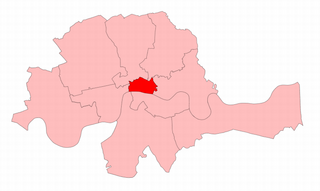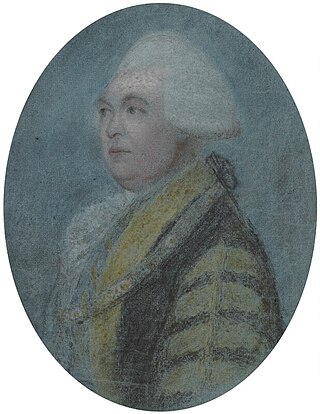Related Research Articles

Charles Manners-Sutton, 1st Viscount Canterbury, was a British Tory politician who served as Speaker of the House of Commons from 1817 to 1835.

The 2010 United Kingdom general election was held on Thursday 6 May 2010, to elect Members of Parliament to the House of Commons. The election took place in 650 constituencies across the United Kingdom under the first-past-the-post system. The election resulted in a large swing to the opposition Conservative Party led by David Cameron similar to that seen in 1979, the last time a Conservative opposition had ousted a Labour government. The governing Labour Party led by the prime minister Gordon Brown lost the 66-seat majority it had previously enjoyed, but no party achieved the 326 seats needed for a majority. The Conservatives won the most votes and seats, but still fell 20 seats short. This resulted in a hung parliament where no party was able to command a majority in the House of Commons. This was only the second general election since the Second World War to return a hung parliament, the first being the February 1974 election. This election marked the start of Conservative government for the next 14 years.
Wigtown Burghs, also known as Wigton Burghs and Wigtown District of Burghs, was a constituency of the House of Commons of the Parliament of Great Britain from 1708 to 1800 and of the House of Commons of the Parliament of the United Kingdom from 1801 to 1885. It was represented by one Member of Parliament (MP).

The City of London was a United Kingdom parliamentary constituency. It was a constituency of the House of Commons of the Parliament of England then of the Parliament of Great Britain from 1707 to 1800 and of the Parliament of the United Kingdom from 1801 to 1950.

Westminster was a parliamentary constituency in the Parliament of England to 1707, the Parliament of Great Britain 1707–1800 and the Parliament of the United Kingdom from 1801. It returned two members to 1885 and one thereafter.
Ashburton was a borough constituency represented in the House of Commons of the Parliament at Westminster, for the Parliaments of 1295 and 1407, and regularly from 1640 until it was abolished for the 1868 general election. It was one of three Devon borough constituencies newly enfranchised in the Long Parliament. It returned two Members of Parliament until the 1832 general election when the number was reduced to one MP.
Bolton was a borough constituency centred on the town of Bolton in the county of Lancashire. It returned two Members of Parliament (MPs) to the House of Commons for the Parliament of the United Kingdom, elected by the bloc vote system.
Cricklade was a parliamentary constituency named after the town of Cricklade in Wiltshire.
Warwickshire was a parliamentary constituency in Warwickshire in England. It returned two Members of Parliament (MPs), traditionally known as knights of the shire, to the House of Commons of England, Great Britain and House of Commons of the Parliament of the United Kingdom, elected by the bloc vote system.
Portsmouth was a borough constituency based upon the borough of Portsmouth in Hampshire. It returned two members of parliament (MPs) to the Parliaments of England, Great Britain and from 1801 the House of Commons of the Parliament of the United Kingdom, elected by the bloc vote system.
Lyme Regis was a parliamentary borough in Dorset, which elected two Members of Parliament (MPs) to the House of Commons from 1295 until 1832, and then one member from 1832 until 1868, when the borough was abolished.

Sir Watkin Lewes was a Welsh merchant and politician who served as Lord Mayor of London in 1780.
Thomas Higgins was an Irish nationalist politician, auctioneer and farmer, who as member of the Irish Parliamentary Party was posthumously declared elected Member of Parliament of the House of Commons of the United Kingdom of Great Britain and Ireland in 1906.
The 2010 Labour Party leadership election was triggered on 10 May 2010 by incumbent leader Gordon Brown's resignation following the 2010 general election which resulted in a hung parliament; the first since 1974. Brown resigned as Leader of the Labour Party on 10 May and as Prime Minister on 11 May, following the Conservatives and Liberal Democrats forming a coalition government. The National Executive Committee decided the timetable for the election the result of which would be announced at the annual party conference. On 25 September 2010, Ed Miliband became the new Leader of the Labour Party, narrowly defeating his older brother, David Miliband.
David Barclay was an English Whig politician who sat in the House of Commons variously between 1826 and 1847.

John Sawbridge was an English politician who sat in the House of Commons from 1768 to 1780.

Edmund Buckley was a British Conservative Party politician. He was a successful industrialist, owning iron works, collieries and cotton mills. He was the Chairman of the Manchester Exchange during the 1850s, resigning that post in 1860.
The 1878 Bristol by-election was fought on 14 December 1878. The by-election was fought due to the resignation of the incumbent Liberal MP, Kirkman Hodgson. It was won by the Liberal candidate Lewis Fry.

Christopher Atkinson, from about 1798 known as Christopher Atkinson Savile or Saville, was an English merchant and politician.
References
- 1 2 Leigh Rayment's Historical List of MPs – Constituencies beginning with "L" (part 3)
- 1 2 3 Stooks Smith, Henry. (1973) [1844-1850]. Craig, F. W. S. (ed.). The Parliaments of England (2nd ed.). Chichester: Parliamentary Research Services. p. 210. ISBN 0-900178-13-2.